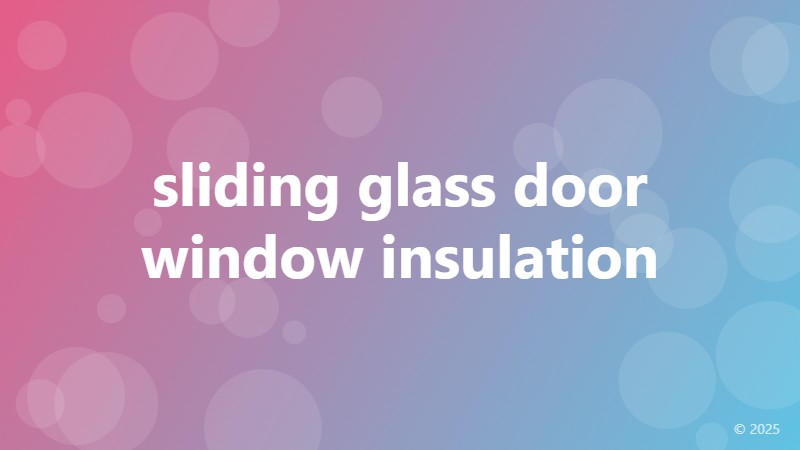sliding glass door window insulation

The Importance of Sliding Glass Door Window Insulation
Sliding glass doors are a staple in many modern homes, providing an unobstructed view of the outdoors while allowing natural light to flood in. However, these doors can also be a significant source of heat loss and gain, making your home less energy-efficient and increasing your energy bills. This is where sliding glass door window insulation comes in – a crucial aspect of maintaining a comfortable and energy-efficient living space.
Why Insulate Your Sliding Glass Door Windows?
There are several reasons why insulating your sliding glass door windows is essential. Firstly, it helps to reduce heat transfer between the indoors and outdoors, keeping your home warm in the winter and cool in the summer. This, in turn, reduces the load on your heating and cooling systems, leading to significant energy savings. Additionally, insulation helps to minimize condensation on the glass, reducing the risk of water damage and mold growth.
Furthermore, insulated sliding glass door windows can also help to reduce noise pollution, making your home a more peaceful and comfortable living space. By blocking out external noise, you can enjoy a quieter and more relaxing environment, perfect for relaxation or focus-intensive activities.
Types of Sliding Glass Door Window Insulation
There are several types of insulation materials available for sliding glass door windows, each with their unique benefits and drawbacks. Some of the most common types of insulation include:
- Low-E glass coatings: These coatings reduce heat transfer by reflecting heat rather than absorbing it. They are a popular choice for sliding glass door windows due to their energy-efficiency and affordability.
- Thermal curtains or drapes: These are a cost-effective and easy-to-install solution for insulating sliding glass door windows. They work by trapping a layer of air between the curtain and the glass, reducing heat transfer and minimizing energy loss.
- Window film: This is a clear, adhesive film that can be applied to the glass surface. It helps to reduce heat gain during the summer and heat loss during the winter, making it an effective solution for energy-conscious homeowners.
DIY vs. Professional Sliding Glass Door Window Insulation
When it comes to insulating your sliding glass door windows, you have two options: DIY or professional installation. While DIY solutions may seem appealing due to their cost-effectiveness, they may not provide the same level of energy efficiency and durability as professional installations.
Professional installers have the necessary expertise and equipment to ensure a precise and effective installation. They can also recommend the most suitable insulation materials for your specific needs and budget.
Conclusion
In conclusion, sliding glass door window insulation is a crucial aspect of maintaining a comfortable and energy-efficient living space. By understanding the importance of insulation and exploring the various types of insulation materials available, you can make an informed decision that meets your specific needs and budget. Whether you opt for DIY or professional installation, insulating your sliding glass door windows is a worthwhile investment that will pay off in the long run.